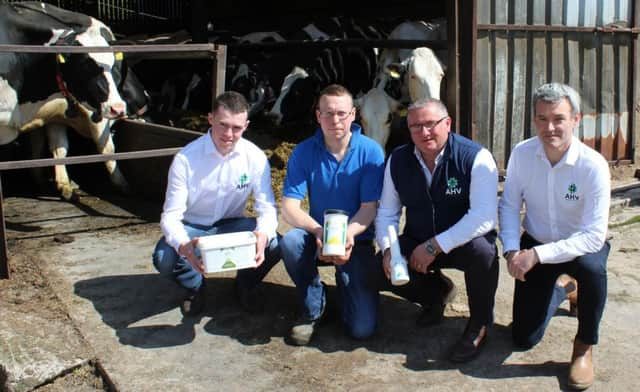AHV approach to high cell counts is making a difference


The farm in question is home to the Kilwarlin pedigree Holstein herd. Owned by the Stewart Law, the dairy enterprise is managed by Christopher Simpson.
The 140-strong herd is currently averaging 11,500L – projected to reach 12,000L before the end of the 2019 calendar year. The average butterfat is 3.8% with proteins coming in at 3.3%.
Advertisement
Advertisement
“We have 115 cows being milked by two robots the year round. Our aim is to install a third robot over the coming months,” Christopher explained. “The cows are maintained indoors throughout the year. We take four cuts of grass silage, grow our own wholecrop and, in addition, produce our own Alkagrain wheat.
“Improving herd health and reducing the quantities of antibiotic used are key drivers for the farm at the present time. Our cell count is currently averaging 129,000. Our aim is to get this figure below 100,000 within the foreseeable future.
“If achieved, it will improve the milk price and reflect the higher health status, which the cows will have achieved.”
The commitment to reducing the levels of antibiotic usage on the farm encouraged Christopher to trial the AHV range. This came about courtesy of a meeting with AHV’s Paul Marrs at last year’s Royal Ulster Winter Fair.
Advertisement
Advertisement
Christopher continued: “I knew that we had the wherewithal to identify high cell counts almost immediately, courtesy of the Asti Cell software package that were specified with the robots. The plan was then to use the AHV Extra boluses, as soon as a cell count spike was identified.
“That’s exactly what we have done. The boluses act to reduce cell counts within a small number of days. In addition, the cows do not go off their milk and there is no milk withdrawal.
“We started using the boluses three months ago and we haven’t had a case of clinical mastitis during this period. Neither have we had any cows losing quarters.
“As a matter of course we also drench the cows with the ASPI anti-inflammatory, when applying the bolus. One, very much, complements the other.”
Paul Marrs was a recent visitor to the Law farm.
Advertisement
Advertisement
“Antimicrobial resistance is not a new phenomenon. Microorganisms, including bacteria, have been dealing with this issue almost since the beginning of time,” he explained. “Fortunately, modern scientific research has succeeded in identifying how nature has successfully dealt with this problem.
“AHV was established to convert this science into practical solutions for livestock farmers, who are having to deal with the disease-related impact of pathogenic bacterial infections on a regular basis.”
Paul continued: “We know that bacteria must gather together in large groups in order to impact on the host animal. To make this happen they must communicate with each other through a process called ‘quorum sensing’. In essence, individual bacteria emit signal molecules so as to make this grouping process come about.
“In response, AHV products have been developed to disrupt this communication process, thereby abolishing the impact that pathogenic bacteria could have when entering a host animal.
Advertisement
Advertisement
“We also know that the attacking pathogenic bacteria produce biofilm around their cells, which acts as a protective shield to protect them from the animal’s own immune cells and from antibiotics. The AHV product range breaks down these biofilm layers and supports the cow’s natural immune system: because of this combined activity, invading pathogenic bacteria are more predisposed to attack by the animal’s immune system.
“The end result is a process that directly impacts on the ability of pathogenic bacteria to cause disease without a reliance on antibiotics.”
AHV International’s headquarters for the UK and Ireland is located at Augher in Co Tyrone. Adam Robinson is the managing director of the new business. He accompanied Paul during his visit to the Law farm.
Adam explained: “The company’s track record in the Netherlands and a host of other countries around the world confirms the efficacy of the AHV product range.
Advertisement
Advertisement
“Farmers are fully aware of the need to reduce their reliance on antibiotics. The challenge of anti-microbial resistance is now a key priority for health professionals, veterinarians and the public at large, given the recent emergence of pathogens that are becoming resistant to almost every antibiotic that is currently available.”
The AHV product range consists of a mix of boluses, drenches and calf powders. They comprise a combination of natural feed supplements. The treatments act specifically to restore the normal bacterial population balance in those parts of the host’s body that have become subject to pathogenic attack.